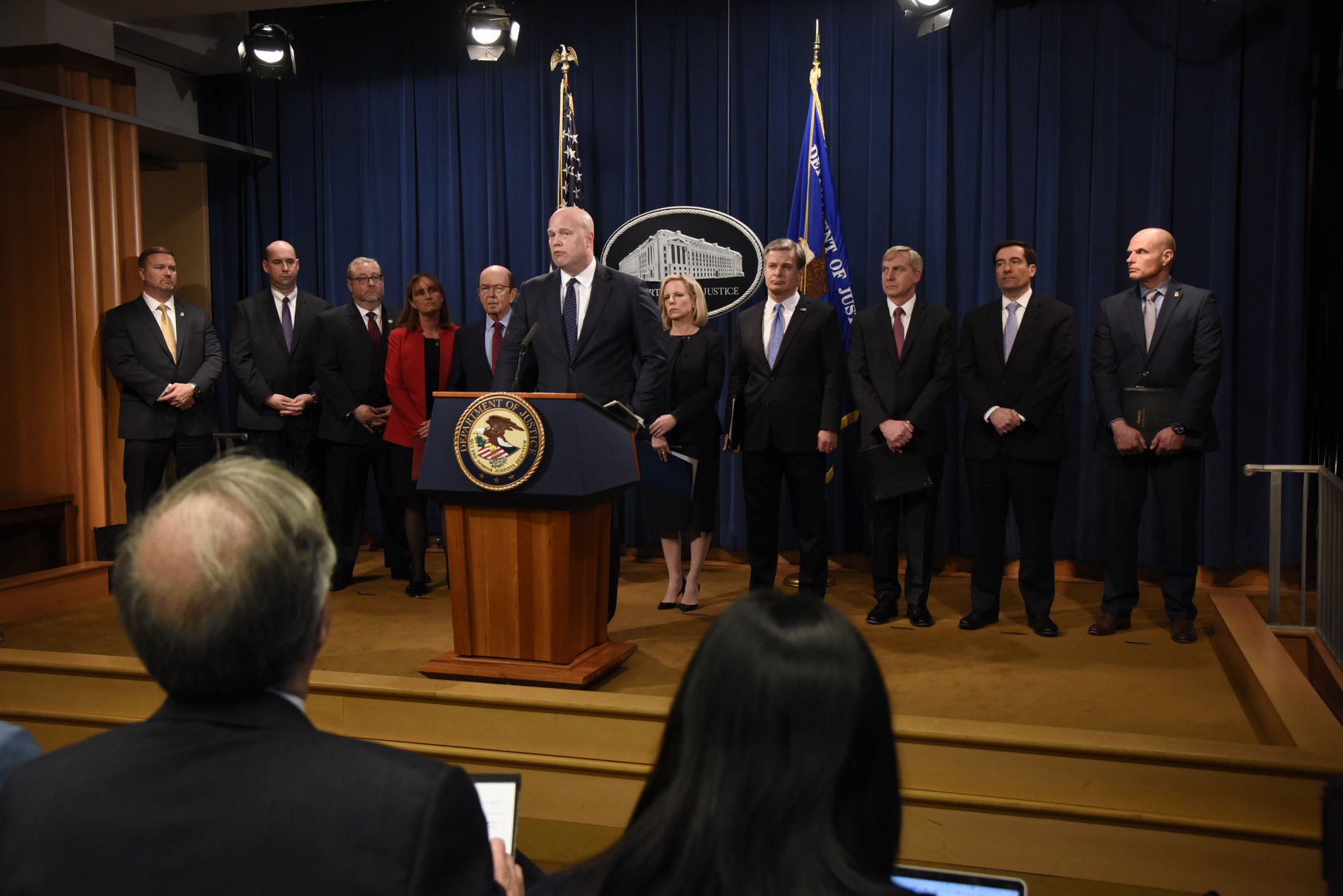The US Department of Justice today formally announced charges against Shenzhen-based telecoms giant Huawei, its CFO, and two affiliate companies, accusing them of corporate espionage and violating sanctions against Iran.
The indictment revolves around a Hong Kong-registered company called Skycom, which US officials accuse Huawei of operating as an unofficial affiliate to skirt sanctions leveled against Iran. An overview of the indictment released by the Justice Department further accuses Huawei of deliberately misrepresenting its relationship with Skycom in order to process millions of US dollars’ worth of Iran-related transactions in US banks — transactions they were forbidden from processing under the sanctions.
“As I told Chinese officials in August, China must hold its citizens and Chinese companies accountable for complying with the law,” acting US Attorney General Matthew Whitaker said at a press conference announcing the charges.
US Secretary of Homeland Security Kirstjen Nielsen, meanwhile, accused the company of engaging “in a fraudulent financial scheme that is detrimental to the security of the United States.”
The overview of the indictment goes on to allege that Huawei misled multiple financial institutions and “repeatedly lied” to US authorities about its business in Iran over the years.
Justice officials say the company’s CFO, Meng Wanzhou — who is currently in custody in Canada at the US’ request, and whose detention has severely strained Sino-Canadian relations — once served on Skycom’s board of directors, and played a direct part in lying to Huawei’s banking partners. The US is currently seeking Meng’s extradition from Canada.
Meng has been charged with bank fraud, wire fraud, and conspiracies to commit bank and wire fraud. In addition to facing the same charges, Huawei and Skycom are also charged with violating the Iran sanctions and conspiracy to commit money laundering. Meanwhile, Huawei and Huawei USA, its American affiliate, are also charged with conspiracy to obstruct justice for their alleged efforts to stymie the US’s attempts to investigate their ties to Iran.
The indictment accuses the companies of attempting to move relevant witnesses back to China and beyond investigators’ reach, and of destroying relevant evidence located in the US.
Another indictment, issued by a grand jury in Seattle, accuses Huawei and Huawei USA of stealing technology from US telecoms firm T-Mobile in the form of a cell phone testing robot dubbed “Tappy.”
Tappy was designed — “at significant expense to T-Mobile,” the indictment notes — to mimic the way people touch their phone screens for the purposes of testing phones’ performance over long periods of time.
T-Mobile went to great lengths to protect Tappy’s technology, but over time began to allow other companies — Huawei among them — to use the robot for their own tests. Around 2012, Huawei began developing its own robot, the more prosaically named xDeviceRobot.
When T-Mobile declined to sell or license Tappy’s technology to Huawei, the company undertook a scheme to “figure out the [Tappy] Robot’s specifications and functions,” according to a Huawei email quoted in the indictment.
At the direction of colleagues in China, Huawei USA engineers supplied unauthorized photos of Tappy and its software interface to Huawei China, and continued to press T-Mobile’s engineers on Tappy’s technical specifications, to their increasing annoyance.
“TMO [T-Mobile] is VERY angry [at] the questions we asked,” one Huawei USA engineer wrote to his colleagues in an email cited in the complaint.
The Huawei engineer allegedly ultimately went so far as to steal Tappy’s arm, only to be found out by T-Mobile employees and made to return the part. At that point, T-Mobile barred Huawei employees from the facility without an escort.
The indictments come as the US wages a campaign to convince its allies to follow suit in shutting Huawei out of the global internet transitions to 5G, citing security concerns.
In a statement, Huawei denied the allegations against itself, its affiliates, and Meng, according to a CNBC report.
“The Company denies that it or its subsidiary or affiliate have committed any of the asserted violations of U.S. law set forth in each of the indictments, is not aware of any wrongdoing by Ms. Meng, and believes the U.S. courts will ultimately reach the same conclusion,” the statement reads.
Beijing, meanwhile, has condemned the charges against Huawei as “unfair” and “immoral.”





Reader Interactions